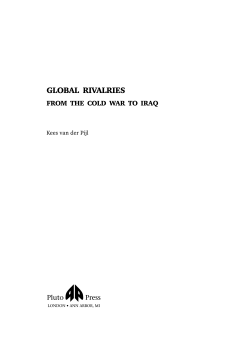
Additional Information
Book Details
Abstract
This book offers a highly original analysis of world events in the light of the Iraq War. It explores the history and development of relations between major countries in the international community and the impact that successive wars and changes in the global political economy have had on the way states relate to each other today.
Tracing the liberal state structure back to the closing stages of the English Civil War and settlement in North America, it argues that the rise of the English-speaking West has created rivalries between contender states that are never entirely put to rest. With each round of Western expansion, new rivalries are created.
Offering a truly global analysis that covers every area of the world - from Europe and America to China, the Middle East, Latin America and Russia -- he analyses the development of international relations post WWII, and questions whether the neoliberal project and its human rights ideology have collapsed back into authoritarianism under the guise of the 'war on terror'.
'Kees Van Der Pijl has done a remarkable job of viewing the global rivalries in a fresh perspective of 'contender states''
Free Press Journal
'Adds more punch to your repository of arguments against the ongoing mindless violence'
The Financial Express
'Just when you thought International Relations as a field was brain-dead, along comes Kees van der Pijl's new book. His inspired account brings together history, economics and politics to create a far more nuanced view of rivalry and cooperation among the great powers over time'
Thomas Ferguson, University of Massachusetts, Boston
'A remarkable panorama of both the substance and meaning of recent world history, one of those rare books that will change the way thoughtful people think. Global Rivalries is rich in insight, making coherence of disparate events, and it offers again and again fresh insights into the way our war-torn, beleaguered world has operated'
Gabriel Kolko
'A magisterial work that explains and demystifies the rivalries and conflicts which have characterised the foreign relations of the "great powers" in the modern era'
Stephen Gill, York University, Toronto
'This is a delightfully objective, fair and fearless analysis of a strife-tired world ... A strategist's collector's item'
Tribune
'I can't think of a more effective way to bring economic history back into political discussions'
European Tribune
Table of Contents
| Section Title | Page | Action | Price |
|---|---|---|---|
| Contents | Black:4 | ||
| 1. FRACTURES AND FAULTLINES IN THE GLOBAL POLITICAL ECONOMY | Black:20 | ||
| The Making of the 'West' and the Contender State Challenge | Black:20 | ||
| Systemic and Transnational Rivalries | Black:31 | ||
| Industrial Competition and Capitalist Discipline | Black:40 | ||
| 2. INTEGRATION AND RIVALRY IN EUROPE AND THE MIDDLE EAST | Black:52 | ||
| Cold War Antecedents of European Integration | Black:52 | ||
| Anglo- American Redistribution and State Formation in the Middle East | Black:61 | ||
| The Resurrection of the Strong State in France | Black:69 | ||
| 3. AMERICA'S CRUSADE IN ASIA AND THE EURO- ATLANTIC RIFT | Black:85 | ||
| The Illusion of an Atlantic Europe | Black:85 | ||
| Asian Killing Fields: Indo- China and Indonesia | Black:94 | ||
| Gaullist France and the Remaking of the Post- War Atlantic Order | Black:106 | ||
| 4. THE SPECTRE OF SOCIAL AND ECONOMIC DEMOCRACY | Black:123 | ||
| May 1968 and the New Freedom | Black:123 | ||
| The Middle East and OPEC as New Contenders | Black:131 | ||
| The Drive for a New International Economic Order | Black:141 | ||
| 5. TRANSNATIONAL RIVALRIES AND THE NEOLIBERAL TURN | Black:157 | ||
| Contending Forces in the Strategy of Tension | Black:157 | ||
| Disciplining the Heartland in the Interregnum | Black:167 | ||
| Neoliberal Civil Society against the State | Black:176 | ||
| 6. FROM PINOCHET TO THE REAGAN DOCTRINE | Black:196 | ||
| Latin America's Contender State Experience and Atlantic Rivalry | Black:196 | ||
| Oligarchic Privatisation in the Debt Trap | Black:207 | ||
| Attacking the Weak Links of the 'Third World': Africa and Central America | Black:218 | ||
| 7. THE RAPALLO SYNDROME AND THE DEMISE OF THE SOVIET UNION | Black:235 | ||
| The USSR as a Contender State | Black:235 | ||
| Atlantic Rivalries in the New Cold War | Black:244 | ||
| Rival Responses to Gorbachev's New Look | Black:256 | ||
| 8. AMERICA OVER EUROPE IN THE BALKANS CRISIS | Black:275 | ||
| Social Forces in the Clinton Globalisation Offensive | Black:275 | ||
| Rival Responses to the Crisis in Yugoslavia | Black:285 | ||
| Americanisation of the European Union against the United States? | Black:298 | ||
| 9. THE RISE OF CHINA AS THE NEW CONTENDER | Black:316 | ||
| China's Reintegration into the Capitalist World Economy | Black:316 | ||
| The Asian Crisis and the Disruption of the Japan- centred Order | Black:327 | ||
| The Asia- Pacific Geopolitical Triangle - The US, Japan and China | Black:336 | ||
| 10. ENERGY CONFLICTS IN THE POST- SOVIET ERA | Black:355 | ||
| From 'Iran - Contra' to the First Gulf War | Black:355 | ||
| Struggles over Caspian Energy Resources and the 'New Silk Road' | Black:366 | ||
| Afghanistan, 11 September, and the Invasion of Iraq | Black:377 | ||
| 11. FROM HUMAN RIGHTS TO THE GLOBAL STATE OF EMERGENCY | Black:398 | ||
| The Aesthetics of Imperialist Geopolitics | Black:398 | ||
| Rival Concepts of Human Rights | Black:406 | ||
| From Humanitarian 'Just Wars' to the Global War on Terror | Black:413 | ||
| References | Black:430 | ||
| Index | Black:460 | ||
| About the Author | Black:19 |
